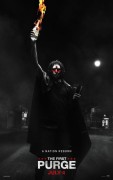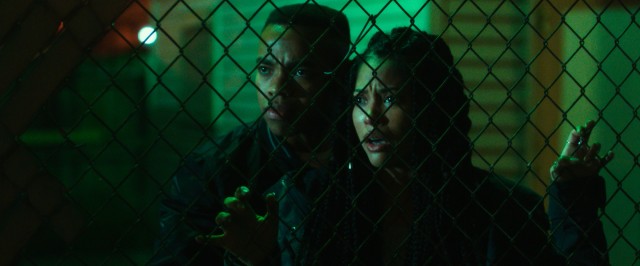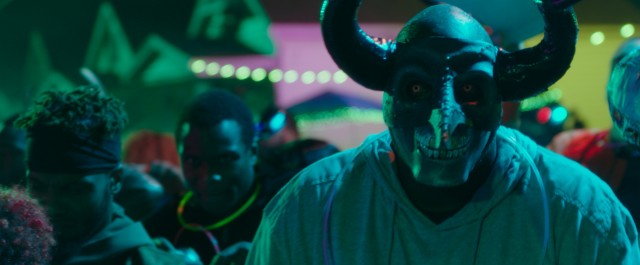The First Purge Movie Review
 |
The First Purge
Theatrical Release: July 4, 2018 / Running Time: 97 Minutes / Rating: R Director: Gerard McMurray / Writer: James DeMonaco Cast: Y'lan Noel (Dmitri), Lex Scott Davis (Nya), Joivan Wade (Isaiah), Mugga (Dolores), Patch Darragh (Chief of Staff - Arlo Sabian), Marisa Tomei (The Architect - Dr. Updale), Luna Lauren Velez (Luisa), Kristen Solis (Selina), Rotimi Paul (Skeletor), Mo McRae (7 & 7), Jermel Howard (Lorenzo), Siya (Blaise), Christian Robinson (Capital A), Steve Harris (Freddy), Derek Basco (Taz), D.K. Bowser (Sharpie), Mitchell Edwards (Kels), Maria Rivera (Anna), Chyna Layne (Elsa), Ian Blackman (Bracken - NFFA President), Melonie Diaz (Juani), Naszir Nance (Terence), Peter Johnson (Pastor Carl Armory) |
Released in the summer of 2013, The Purge had an original idea -- what if all crime was legal for one night? -- that resonated with moviegoers. Now, on America's birthday, we jump back with The First Purge, a prequel that seems squarely aimed at the African-American community, a key demographic for horror films and one which helped turn Black Panther into the highest-grossing film of the year and third highest of all time domestically.
Set seemingly in the present day, The First Purge unleashes upon Staten Island an unprecedented social experiment. The citizens of New York City's least glitzy bororough have been invited to participate in a study by the New Founding Fathers of America (NFFA) to discover what happens when laws are removed and all crime, even murder, is okay. The experiment was hatched by one Dr. May Updale (Marisa Tomei, looking out of place), who stresses there are no political motivations to the project. Alas, low-income residents seem specifically targeted since NFFA is offering payouts starting at $5,000 just to stick around and more to be an active violent participant in what is known as The Purge.
After some spirited protest for and against it, the experiment arrives and we are treated to the March night from a number of perspectives, almost all of them African-American. These include D'mitri (Y'lan Noel), a feared and respected kingpin isn't sold on the concept of legal crime; his ex-girlfriend Nya (Lex Scott Davis), a staunch and vocal opponent of The Purge who plans to spend the night in Church; her younger brother Isaiah (Joivan Wade), who is good at heart but intrigued by opportunity; and Skeletor (Rotimi Paul), a scarred lunatic whose attack drove Isaiah into participation.
Participants are fitted with neon-colored contact lenses that ostensibly record everything that happens from their own point-of-view while also looking eerie and establishing the sides for viewers. And with that, hours of legal crime ensue.
As with the other Purge movies (of which I've only previously seen the fir--...uh, original), this one laces its violence with some social commentary. But the commentary quickly fades and the violence lingers. That doesn't sit well with me, although it's not as if you expect differently from an R-rated horror film. Still, this one -- which was written (like the first three) but not directed (unlike the first three) by James DeMonaco -- adds a regrettable air of exploitation with its casual treatment of class and race concerns.
Nonetheless, many of those in attendance at my barely advance screening cheered loudly as black protagonists bring violent ends to neo-Nazis and Ku Klux Klansmen who have been brought in to the Island to shake things up and make the Purge a success. DeMarco passes the directing mantle to Gerard McMurray, a Fruitvale Station associate producer who made his feature directing debut on Netflix's Burning Sands last year. It seems appropriate for an African-American to man the helm of this film, given its points of view, but the personnel change does nothing to ease the many problematic aspects of the film, which include a mid-end credits teaser for USA Network's forthcoming "The Purge" TV series.
|
Related Reviews:
DVDizzy.com | DVD and Blu-ray Reviews | New and Upcoming DVD & Blu-ray Schedule | Upcoming Cover Art | Search This Site
DVDizzy.com Top Stories:
Now in Theaters: Hereditary • Ocean's Eight • Ant-Man and the Wasp • Uncle Drew • Incredibles 2 • First Reformed
Blumhouse Productions: Get Out • Paranormal Activity 2 • Insidious • Insidious: Chapter 2 • Dark Skies
Black Panther • Fruitvale Station
Text copyright 2018 DVDizzy.com. Images copyright 2018 Universal Studios and Blumhouse Productions.
Unauthorized reproduction prohibited.

